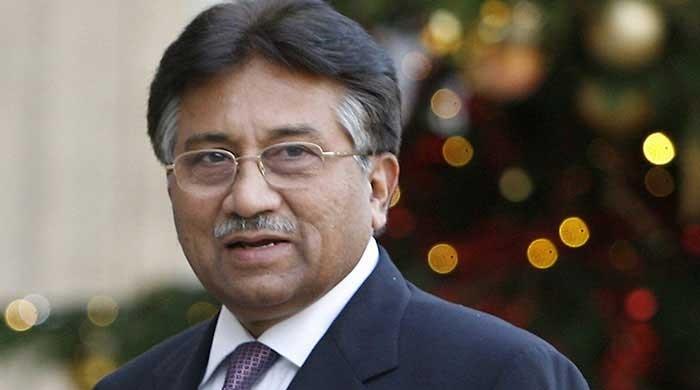Formation of special court to try Pervez Musharraf unlawful, expert tells LHC
 Former president and retired general Pervez Musharraf. Photo: File
Former president and retired general Pervez Musharraf. Photo: File
The constitution of a special court to try former president Pervez Musharraf was not done according to the law, the Lahore High Court (LHC) was told on Friday in a case pertaining to a review of the formation of a special court that handed Musharraf the death penalty.
A special court on December 17 had convicted Musharraf for high treason and handed him the death penalty on five counts in a 2-1 majority verdict. Subsequently, Musharraf had approached the LHC with three petitions, filed earlier this week, against the conviction.
The former president had challenged not only the conviction, but also the formation of the special court that handed him the death penalty for high treason, as well as the complaint filed against him by the government of former prime minister Nawaz Sharif that resulted in the trial.
Also read: LHC to take up Musharraf’s petitions against high treason conviction
A day earlier, a three-member bench of the high court had observed it could not hear the appeal against the death sentence handed out to the former president, but agreed to admit the petition against the formation of the special court in the high treason case.
The bench, comprising Justice Syed Mazahar Ali Akbar Naqvi, Justice Muhammad Ameer Bhatti and Justice Chaudhry Masood Jahangir, held another hearing into the case today. Additional Attorney-General (AAG) Ishtiaq Khan and the counsels for the petitioner appeared in court today.
Upon hearing the arguments made by the additional attorney general yesterday, the court had summoned senior lawyer Ali Zafar today to testify before the bench as a legal expert. In his remarks, Zafar appeared to largely back the statements made by AAG Ishtiaq.
Also read: Musharraf treason case: Special court hands death penalty to former military ruler
"The complaint filed against the former president was not filed through the right authority, the formation of a special court to hear the case was also unlawful, and even the case that was made against the former ruler was not according to the law," Zafar told the court.
"The attorney general forwarded a summary to the PM Office dated June 2013 in which reference was made to the Musharraf case. However, it was on December 29, 2013, that the interior ministry was accorded the authority to file a complaint against the former president," he noted.
Zafar also maintained that whenever a law mandated that a case be filed in these matters, the federal cabinet was endowed with the authority to have the final say on the issue. "Who will give permission to the authorities to file such a complaint?" Zafar questioned.
Also read: Supporting Musharraf would be an historical injustice, says Raza Rabbani
In response to the query, Justice Naqvi remarked that the name of the president should have been on the complaint, and in this particular instance, the prime minister had given the permission to file the complaint against the former president and retired general.
"Under the rules of business, the authority that rests with the president was transferred to the Secretary Interior in this case," Zafar told the court, adding that the additional attorney general had already told the court that the federal cabinet had not approved the complaint.
"Under these circumstances, the grounds for the filing of the case are questionable. No meeting of the federal cabinet was held to discuss the case, according to my knowledge," Zafar told the bench in response to a question about the cabinet meetings on the issue back in 2013.
Also read: 'Disappointed' Musharraf to respond to death sentence verdict after consulting legal team
After hearing the remarks made by the senior lawyer, the court asked the interior ministry to produce the summary that ordered the formation of a special court to try the former president and halted proceedings.
The hearing of the case was then adjourned till January 13.
AAG Ishtiaq, representing the federal government, had yesterday informed the LHC full bench that the formation of the special trial court and filing of a complaint against Musharraf were not approved by the cabinet, as required by the law.
The AAG informed the bench that only one letter was available in the record, which was written by the then prime minister Nawaz to the interior ministry, requiring it to initiate an inquiry against Musharraf on the charges of high treason.


Post a Comment